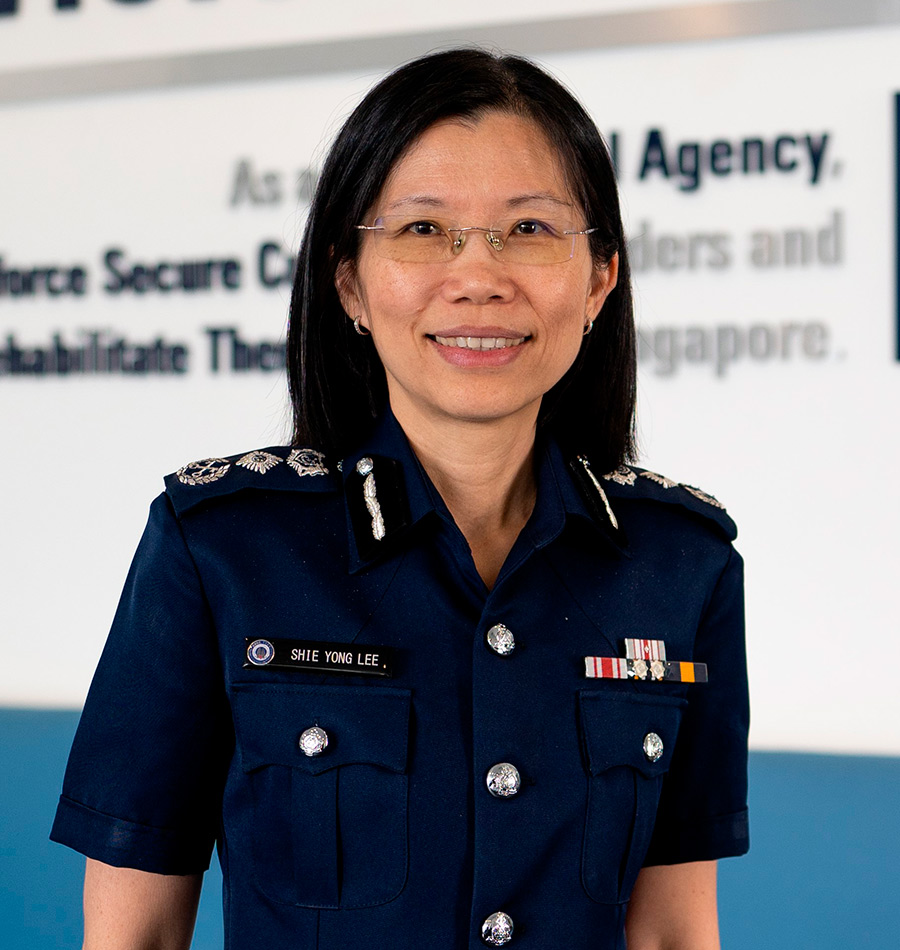Interview
Shie Yong Lee
Commissioner of the Singapore Prison Service
What are currently the main challenges and priorities of the Singapore Prison Service?
SYL: The Singapore Prison Service contributes to public safety by ensuring the safe and secure custody of offenders. We drive rehabilitation and reintegration to prevent re-offending. My officers and I are also known as Captains of Lives, committed to “Rehab, Renew, and Restart” the lives of inmates under our charge, seeking to inspire everyone at every chance.
One of the key priorities of SPS is ensuring that our prisons remain safe and secure. Only when our institutions are safe can we carry out the rehabilitative activities that can help reduce re-offending.
Our prison population has decreased from more than 17,500 in the early 2000s to around 10,500 in 2022. Similarly, our incarceration rate has halved from 438 inmates per 100,000 population in 2003 to 154 in 2021.
Our 2-year recidivism rate1 has declined steadily from a high of 40% for the cohort released in year 2000 to a low and stable rate of about 20% for the last two released cohorts.
While our 2-year rate is low, the 5-year recidivism rate is higher at around 40% for the cohorts released in 2012 and 2016. The 2-year rate is a measure of the outcome of our in-custody and short-term postrelease efforts. The 5-year rate is a measure of how well one desists from crime for good, and to lower it we need a sustainable ecosystem of community support. Preventing re-offending in the long term and sustaining desistance are our key challenges at this point.
International and local research informs us in ways we can promote desistance. One of the key strategies is to enhance community support from employers, volunteers and civil society. Firstly, supportive employers and stable and sustained employment are key to desistance. Our data shows that those employed for at least one year are less likely to re-offend.
Together with Yellow Ribbon Singapore (YRSG)2, we assist inmates to secure jobs before their release. Just this year, the Government introduced a new Uplifting Employment Credit to give wage offsets to employers who hire ex-offenders, subsidising up to 20% of their monthly income, for nine months. This is an example of the inclusive hiring support from the Government.
However, many ex-offenders do not remain in their jobs. Hence, we are working to expand upskilling pathways and enable greater career satisfaction and wage growth.
Pro-social support is another key element to sustaining desistance. We have about 4,500 volunteers and they mainly engage inmates in the custodial phase, or what we call ‘in-care’, as well as helping families of inmates. We call our volunteers ‘throughcare volunteers’ because we want them to continue supporting inmates and their families after release.
Our strategy is to recruit more throughcare volunteers and train them in areas such as general correctional knowledge, befriending skills, self-care, and individual and family work. They become a sustainable support network for the ex-offenders and their families.
Finally, it is vital to engage the public to support second chances. The Yellow Ribbon Project (YRP)3 was developed for that purpose – to raise awareness, generate acceptance and inspire community action.
We have YRP events throughout the year, such as the Yellow Ribbon Culinary Competition, Yellow Ribbon Art Exhibition, and the Yellow Ribbon Run. These events involve inmates, desistors, community partners, and the public.
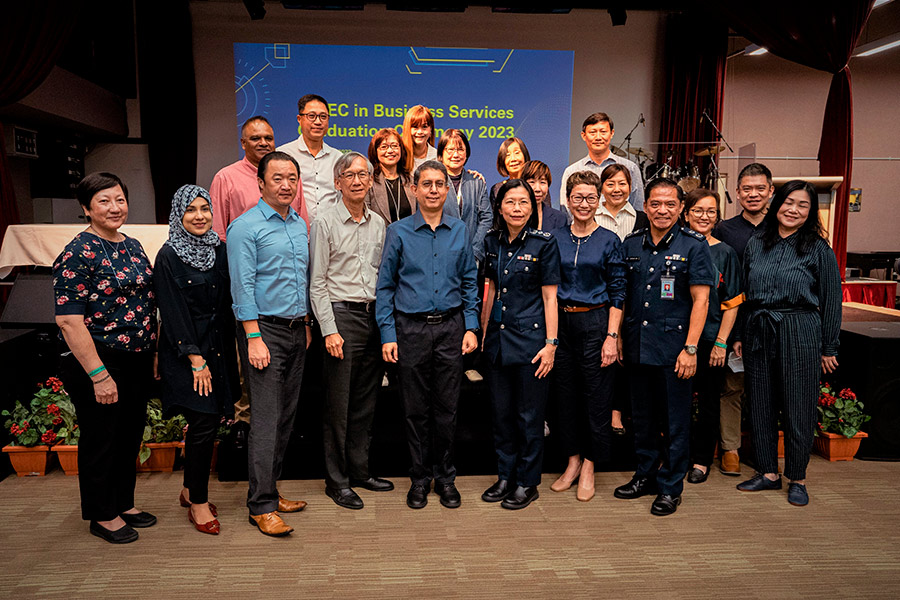
What other initiatives involving the community support the Service’s rehabilitation and reintegration mission?
SYL: In 2022, approximately 3,000 offenders and ex-offenders, who make up approximately 30% of our total offender population, were managed in the community by SPS. This number has more than doubled in the last decade.
Research done by SPS has shown that community-based programmes (CBPs) are effective at reducing re-offending.
We have various types of CBPs for offenders with different risks and needs. These include Home Detention where supervisees reside at home and go to school or work. They have to abide by certain conditions such as electronic monitoring and returning to their residence by a stipulated time. Offenders who do not have good family support may be emplaced on the Employment Preparation Scheme, where they engage in work, studies or training programmes in the community and return to a community supervision centre at the end of the day. We also partner non-government organisations such as Halfway Houses where supervisees stay at and receive structured rehabilitation programmes.
Our staff provides additional support to supervisees on CBP by referring them to community agencies for accommodation and financial support, and connecting them to befrienders when necessary. SPS also works with YRSG to provide skills training, employment assistance and career coaching. Community acceptance and support is key to ex-offenders’ re-integration into society. Next year will mark the 20th anniversary of our Yellow Ribbon Project. We have increased the public’s awareness on the importance of Second Chances and the role that the government, private sector and community play in creating a more inclusive society.
Public perception surveys show that 9 out of 10 members of public believe that with proper guidance,
ex-offenders can be rehabilitated.
We have also stepped-up efforts to partner and empower the community to pro-actively engage ex-offenders and their families. One such initiative is the Yellow Ribbon Community Project (YRCP) that started in 2010 as an initiative whereby grassroots volunteers visit families of newly admitted offenders and refer them to available sources of social assistance.
The YRCP has expanded and we have over 1,100 grassroots volunteers (who are volunteers in the respective communities and neighbourhoods) onboard and over 19,000 families engaged. Including YRCP, SPS and YRSG have grown our overall pool of volunteers significantly from 1,400 in 2010 to over 4,000 volunteers at the end of 2022, to support our rehabilitation and re-integration work. This is almost double the total number of SPS’s staff, and provides a strong complement to our lean workforce.
SPS is setting up a Desistor Network, comprising desistors who have remained crime-free for an extended period of time. This Network connects desistors through events and interest groups. Desistors are a powerful source of inspiration, as they can better identify with and inspire inmates and ex-offenders in their reintegration journey. We are involving more desistors in our programmes, incare and aftercare.
Our community partners and volunteers are key to complement our efforts, and provide crucial pro-social support to ex-offenders when they are released into the community.

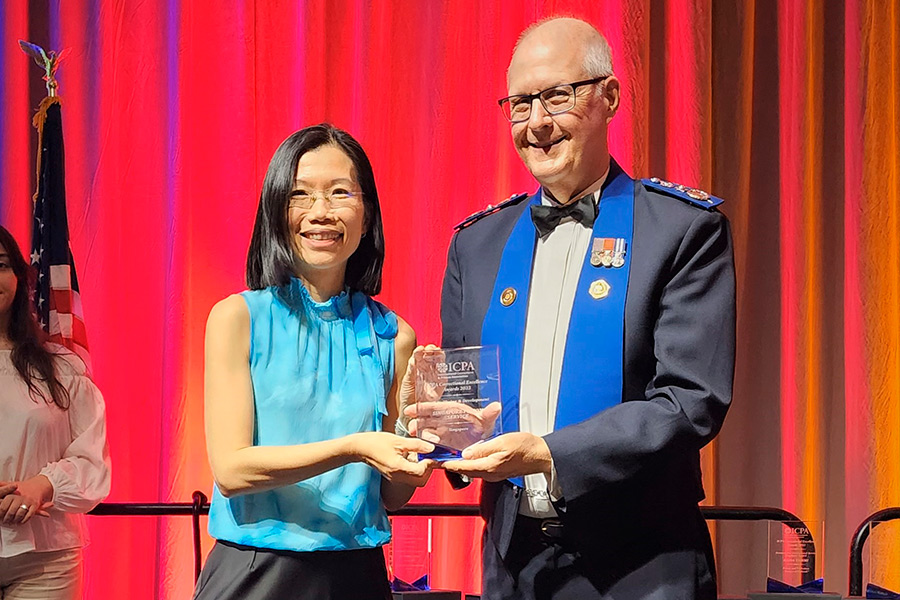
What training and support initiatives are you offering your staff and how do they contribute to realising the officer’s role in the Service’s Captains of Lives vision?
SYL: Captains of Lives are at the heart of our organisation and they are at the centre of the ripple to effect any change. To achieve our ambitious goals amidst resource constraints and challenges, it is critical to ensure that our staff is aligned with our mission, well-equipped, prepared for change and energised to work with not only inmates, but also their families, partners and the community at large. Our staff enforce safety and security, and concurrently serve as change agents and coaches.
We commit resources to training new correctional officers, developing them through courses at different milestones of their careers and ensuring their wellbeing. New officers undergo an 18 to 22-week residential programme comprising classroom learning and scenario-based training in security and rehabilitation syllabus. There are also practical learning days where new officers are partnered with experienced officers and observe how operations are run during a regular shift. This is followed up with 12 to 16 weeks of on-the-job training, under close mentorship.
As the officers progress in their careers, there are key developmental milestone courses to equip them with new knowledge and functional skills, as well as leadership competencies. Selected staff are also sponsored for further studies and learning opportunities.
We also need to regularly refresh and upskill our staff to prepare them for new challenges. In recent years, we have expanded Community Corrections and we now supervise about 3,000 individuals in the community, an increase from about 1,700 in 2017. We have had to re-train our officers in community corrections skills. Recently, we also introduced restorative practices (RP) in our engagement with inmates and have trained our officers in RP so they in turn can train the inmates. To better support desistance, our staff also need new skills to engage family and community partners. Staff are also trained in digital knowledge and skills to better leverage the use of technology, data and robotic process automation to work more efficiently.
At SPS we strongly value the power of coaching. Given our unique operating environment and the challenging nature of our work, we are committed to fostering a robust coaching culture that permeates throughout the entire organisation. Our goal is to cultivate a coaching mindset, a coach-like communication and leadership styles to achieve success at every level. We are stepping up training in the next three years to help our staff contextualise and apply coaching skills in their daily engagements with each other. We believe that when our officers experience coaching positively, they will also apply it with inmates and supervisees.
Correctional work is tough and emotionally draining. Hence, mental health and well-being for our staff is critical.
We launched an initiative to enhance the mental well-being of staff known as the “WeWorkWell” Framework during the onset of the COVID-19 pandemic. We have taken significant steps to improve our staff’s mental health awareness, including creating a safe and supportive environment for individuals to share their struggles, and enhance existing coping strategies.
As part of our WeWorkWell initiative, we regularly share well-being broadcasts and guides via email to equip our team with the skills and knowledge to cope with stress and support others. We also set up a WeWorkWell Telegram channel to increase accessibility of mental well-being information, including videos. Our in-house psychologists deliver curated Mental Wellness workshops for work teams upon request.
To address barriers that staff may face when thinking of seeking help, we ran a #HereWithYou destigmatisation campaign that featured SPS staff across management positions sharing their challenges. To complement the campaign we have made external counselling avenues available for staff, should they be uncomfortable to see a psychologist in the workplace.
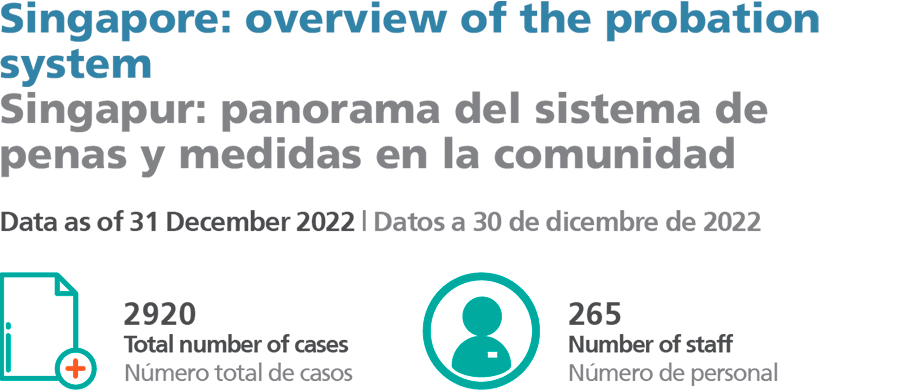
Can you tell us more about how the Singapore Prison Service has been leveraging technology to support prison operations and rehabilitation efforts?
SYL: Data and technology are key enablers to achieve better operational effectiveness and efficiency. For example, we are progressively installing 100% CCTV coverage in all cells and common areas in our prisons.
To leverage all this live footage, we piloted the use of video analytics in one of our newer institutions to detect and respond quickly to irregular behaviours such as fights and self-harm. This improves safety and provides added deterrence as well.
We are also expanding the use of tele-health, in which consultations between inmates and medical specialists from hospitals are conducted virtually where suitable. We do not compromise inmate safety, and tele-consultation provides an additional option to enhance security while optimising resources. We provide electronic tablets to inmates to complement our efforts in both operations and rehabilitation.
The introduction of e-letters on tablets allows increased communication between inmates and their loved ones, and reduces the risk of illegal objects and substances being smuggled into prisons via traditional mail.
The tablets also serve as a platform to address inmates’ rehabilitation needs.
In addition to classroom lessons and physical counselling sessions, inmates can now maximise their time in the cell by accessing videos, e-books and motivational talks.
However, e-programmes are a complement and they cannot replace human interactions with our staff and partners.
In order to enhance the supervision and re-integration of those people serving the tail-end of their sentence in the community, we are also developing a mobile app to list jobs and offer community resources and self-help materials for supervisees. Our staff will also be able to engage and monitor the progress of the supervisees through this platform, on top of physical meetings.
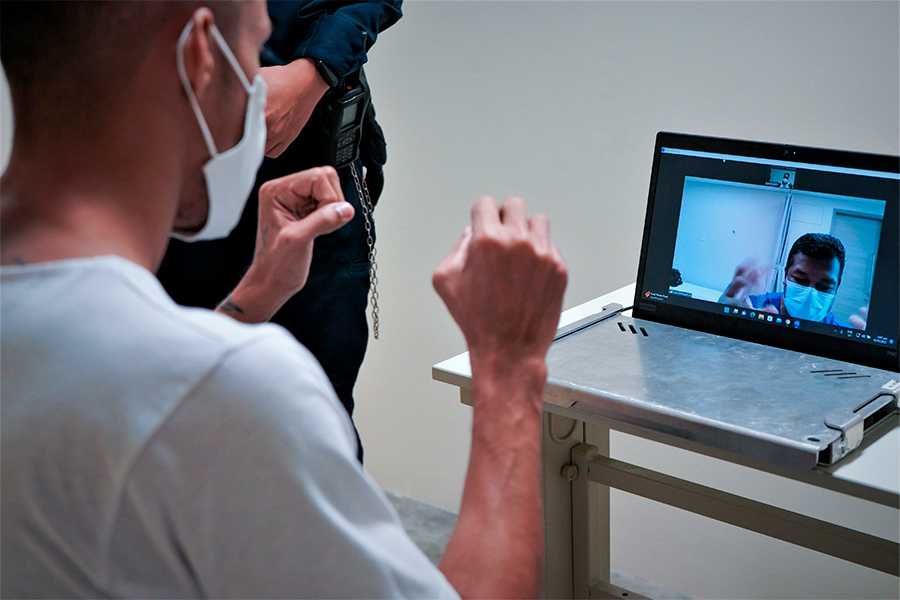
JT: Singapore is a member of the Asian and Pacific Conference of Correctional Administrators (APCCA) and was the Chair of the governing board for 2022. Since 1980, the conference holds an annual meeting to promote cooperation between government officials responsible for prison or correctional administration within the region.
To what extent has regional cooperation been influential in sharing ideas and best practices?
SYL: The APCCA is a forum that connects correctional practitioners in the Asia-Pacific region every year. There are currently 34 APCCA members from 27 countries and regions. The Governing Board (GB) makes key decisions concerning APCCA, and every year a different member is appointed as Chair of the GB. As the host of APCCA 2022, SPS was the Chair of the GB in 2022. Vietnam Prison Management Department is the current Chair and is hosting the event this year.
The annual conference is a key platform for sharing best practices and networking among APCCA members. We have organised and hosted the 2022 conference online which was attended by more than 1,000 participants from 22 countries and regions.
The conversations at the annual APCCA conference continue after we return to our countries. Through a dedicated APCCA website, we can create and send customised surveys to all APCCA members as well as share research materials and publications. A digital APCCA Newsletter is also published every six months for members to share their initiatives, and relevant statistics are collated annually and shared among members.
From time to time, members conduct joint training programmes and host each other for study visits. We also invite one another to events.
For example, in 2018, SPS invited APCCA members to attend the Yellow Ribbon Conference and joint training with the United Nations Office on Drugs and Crime (UNODC) in Singapore. During the pandemic, SPS also organised a webinar titled “Responding to the Challenge of COVID-19 in Corrections”. The webinar allowed APCCA members to learn from one another’s best practices in tackling the challenges posed by the unprecedented pandemic to corrections. In 2022, Malaysia Prisons Department invited countries to attend the 2nd National Security Asia Conference held in Kuala Lumpur. SPS is privileged to be part of APCCA to learn from fellow counterparts and share our experience in corrections.
1 Two-year recidivism rate is defined as the percentage of local offenders under the custody of the Singapore Prison Service, who were subsequently detained or sentenced to imprisonment or day reporting order within two years of release into the community.
2 Yellow Ribbon Singapore (YRSG) is a statutory board under the Ministry of Home Affairs. It was established in 1976 as the Singapore Corporation of Rehabilitative Enterprises (SCORE) and rebranded as YRSG on 1 May 2020. YRSG adopts a multi-faceted approach to prepare ex-offenders for reintegration into society and re-join the national workforce. These include initiatives to help them develop skills and long-term careers through partnerships with industry, as well as initiatives to garner community support and acceptance of ex-offenders.
3 Singapore formed the Community Action for the Rehabilitation of Ex-Offenders (CARE) Network in May 2000. It is a coalition of like-minded agencies, motivated by a common purpose, to help ex-offenders transit back into the community as contributing citizens. In 2004, the Yellow Ribbon Project (YRP) was launched. It is based on the metaphor that every offender encounters two prisons; the first being the physical prison, and the second a ‘social and psychological prison’ of stigmatization. The key to help unlock the second prison is held by the community.
Shie Yong Lee
Commissioner of the Singapore Prison Service
Commissioner Shie Yong Lee joined the SPS in 1995, becoming Deputy Commissioner in 2015 and taking on the role of Commissioner since September 2020. Throughout her time at SPS, Yong Lee has undertaken operational and command positions in the prisons, leadership roles in research, planning, and development of rehabilitation programmes, and conducting policy reviews and legislative changes to facilitate the rehabilitation and reintegration of offenders. She was Head Operations of Changi Women’s Prison, Head Research & Planning, Head Programme, Deputy Director of Civil Defence & Rehabilitation in the Ministry of Home Affairs and Commander of a cluster of five prisons.

